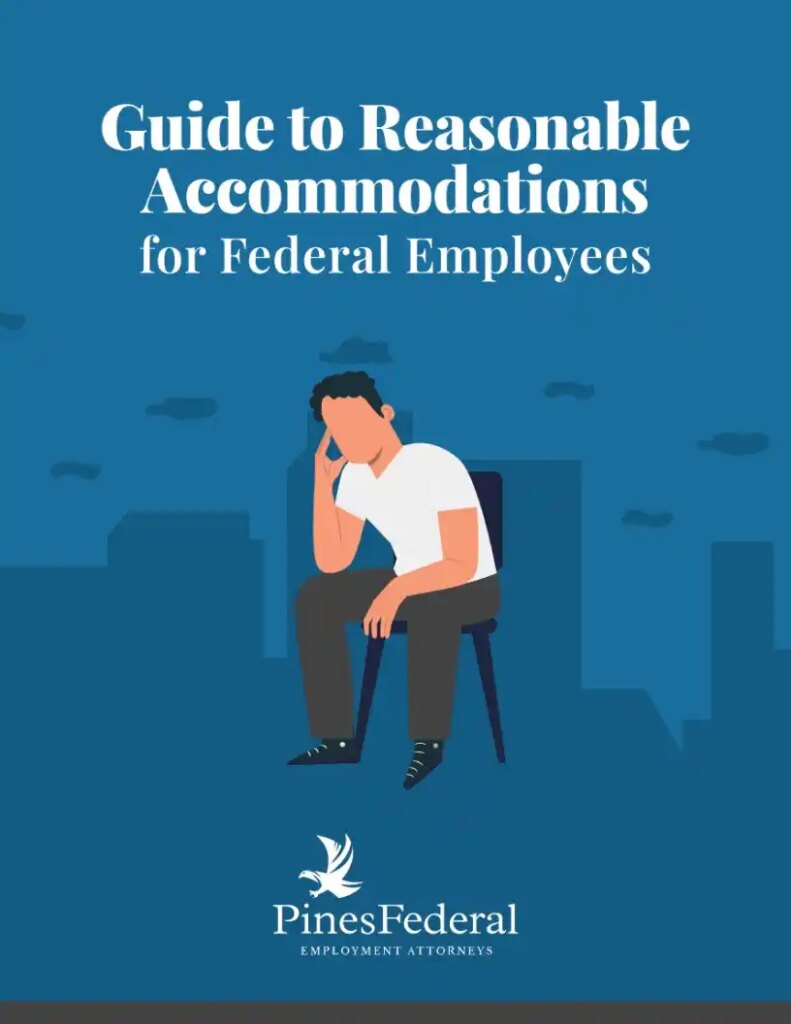
Undue hardship is a critical term when discussing reasonable work accommodations.
It serves as an exception to the requirement that employers provide reasonable accommodations to qualified individuals with disabilities. But, unfortunately, it is a fairly ambiguous phrase.
How do you know if your reasonable accommodation is an undue hardship on your employer? Let’s delve into its definition and implications.
One thing you’ll hear a lot about reasonable accommodations is that they are highly fact-specific. That means it is vital you receive tailored legal advice for your situation.
Fortunately, you can receive the individualized attention you need with our dedicated team of reasonable accommodations attorneys. Set up an appointment today by calling us at (800) 801-0598 or by filling out our online contact form.


“I was so pleased working with Pines Federal. I had peace of mind knowing I would not have to deal with the federal agency and all was taken care of by Pines. They are professional and responsive. I was very happy with the outcome of my case. Hiring Pines was the best decision I made.”
What Is an Undue Hardship and How is the Federal Government Unique?
Undue hardship is a phrase used in the Americans with Disabilities Act (ADA), the cornerstone law of reasonable accommodation. The ADA applies to federal employees through the Rehabilitation Act of 1973.
The phrase “undue hardship” refers to a significant difficulty or expense related to the provision of a workplace accommodation. In simpler terms, if an accommodation is too challenging or costly for an employer to implement, given their resources and circumstances, it might be considered an undue hardship.
Most Americans don’t know about undue hardship under the ADA. But understanding this concept is vital when assessing the likely outcome of your reasonable accommodation request.
That’s because your employer can deny your request for a reasonable accommodation if they can show that your preferred accommodation is such an undue hardship. Absent that showing, your employer generally has to provide your requested accommodation.
Factors for Determining Undue Hardship
Several factors are considered when determining whether a reasonable accommodation constitutes an undue hardship.
- Nature and Cost. The first factor is the nature and net cost of your accommodation. The higher the cost of your accommodation, the more likely it will be an undue hardship for your employer. Since the federal government is one of the top five employers in the world, it has a much higher burden here.
- Geography. The geographic distance between your office and its parent agency. The greater the distance, the more this factor leans in favor of undue hardship.
- Administrative/Fiscal Relationship. This factor inquires into the relationship between your office and the larger agency.
- Financial Resources. The overall financial resources of the facility or facilities involved in offering the accommodation, the number of persons employed at the facility, and the effect on expenses and resources. If your agency has a larger budget, then it will be harder for them to claim undue burden. In general, the federal government is considered one of the wealthiest employers in the world, making it less likely to consider an undue hardship for federal employees.
- Business Type. This factor includes things like the overall size of the business in relation to the number of its employees, as well as the number, type, and location of its facilities.
Finally, courts will consider the potential impact of the accommodation on the facility’s operation. This includes assessing the accommodation’s impact on the ability of other employees to perform their duties and on the facility’s ability to conduct business.
[DOWNLOAD] Reasonable Accommodations for Federal Employees

Undue Hardship Examples
Consider these two hypothetical examples of undue hardship in the federal workplace.
The Local Library
Jem works as an employee for a small bookstore in North Dakota run by the Department of Education.
One day, Jem has an accident that costs him the use of his legs, so he now has to use a wheelchair. He requests that his employer install a wheelchair ramp at the bookstore entrance and that widen the aisles to accommodate his wheelchair.
After an investigation, his agency discovered that installing a ramp and widening the aisles would require significant structural changes due to the age and structure of the building. In fact, the total cost would end up equaling the total annual budget for that bookstore—which would almost certainly be considered an undue hardship.
The Busy Data Entry Firm
Rachel works for a federal data entry office specializing in working 24/7 with customers all over the world in real time.
One day, Rachel’s doctor diagnoses her with chronic fatigue syndrome, meaning that she’ll get tired randomly throughout the day.
Rachel requests a flexible schedule, so she only has work when she has peak energy. Unfortunately, Rachel’s peak energy hours vary wildly from day to day, making it almost impossible for her employer to predict her schedule in advance.
Limitations and Misconceptions
It’s worth noting that the term undue hardship does not simply mean that an employer has to incur some costs. A mere assertion by an employer of an undue hardship is not enough. Instead, they need to provide concrete evidence of substantial difficulty or expense.
Moreover, the mere assertion that providing an accommodation would be financially burdensome isn’t enough. Rather, your employer must show that the accommodation poses a significant difficulty.
Finally, your employer’s provision of accommodations in the past does not prevent them from claiming undue hardship in the future because business circumstances and resources can change.
We Can Help You with Your Reasonable Accommodation Request
Even though you now understand the concept of undue hardship, it isn’t easy to know whether the concept applies to your requested accommodation. As a federal employee, the ball is in your court and the burden is much higher to show undue hardship for the federal government.
The team at Pines Federal understands the complexities and nuances that federal employees must overcome when it comes to their rights under the ADA. Don’t maneuver through the labyrinth of undue hardship and reasonable accommodation alone. Instead, let our seasoned practitioners guide you to safety. Your career, well-being, and peace of mind deserve nothing less.
Contact us now to embark on a journey toward clarity and resolution. Contact us online or at (800) 801-0598 to schedule a consultation.